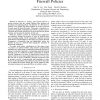6 search results - page 1 / 2 » Reducing policy degradation in neuro-dynamic programming |
ESANN
2006
13 years 5 months ago
2006
We focus on neuro-dynamic programming methods to learn state-action value functions and outline some of the inherent problems to be faced, when performing reinforcement learning in...
INFOCOM
2008
IEEE
13 years 11 months ago
2008
IEEE
—A firewall is a security guard placed between a private network and the outside Internet that monitors all incoming and outgoing packets. The function of a firewall is to exam...
TVLSI
2008
13 years 4 months ago
2008
Thermal hot spots and high temperature gradients degrade reliability and performance, and increase cooling costs and leakage power. In this paper, we explore the benefits of temper...
IEEEPACT
2009
IEEE
2009
IEEE
Soft-OLP: Improving Hardware Cache Performance through Software-Controlled Object-Level Partitioning
13 years 11 months ago
—Performance degradation of memory-intensive programs caused by the LRU policy’s inability to handle weaklocality data accesses in the last level cache is increasingly serious ...
ASPLOS
2011
ACM
12 years 8 months ago
2011
ACM
Main memory is responsible for a large and increasing fraction of the energy consumed by servers. Prior work has focused on exploiting DRAM low-power states to conserve energy. Ho...

